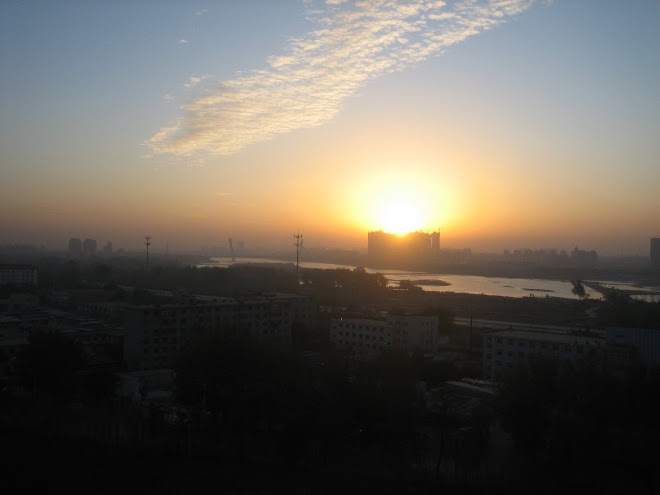 Written April 08
Written April 08Hua Shan, known as one of China’s 5 greatest mountains, famous for its steep slopes and beautiful scenery, is located an hour outside of Xi’an by train. Unfortunately, the tickets that we bought were seatless, so we tried our usual tactic of going into the dining room, where you have to pay extra for the food, but more importantly, seating. So at 7 in the morning, Alain and I found ourselves in the dining room, being served a bland breakfast of Chinese congee (watery rice), man tou (steamed bread), a boiled egg and salted vegetables, that made me think of the military camps (in the movies), where you are served portions of crappy unflavored unidentifiable food and you are expected to eat it. We ate our bread from the bakery on Hui Ming Jie instead.
Upon arrival in the city of Hua Shan, we boarded an overloaded bus that took us over dirt roads into the valley of the mountains. The majority of the people on the bus got off at the first stop, where you can take a cable-car halfway up the mountain. Only 4 of us chose the second stop, where you hike up the entire mountain.
So, wondering if we’d made the right choice, we ventured up the hill, through the entrance, and began our hike up. Our goal: to climb up to the 5 peaks (South, North, Middle, East, and West peaks) and back down before sunset. I think it was better that we didn’t realize just how far we had to go.

The scenery was beautiful as the fog began to clear and the sun accompanied a beautiful blue sky. There were sections of steep and narrow steps where you had to hang on to the rails on each side. We climbed thousands of steps, before we reached our first peak, the South Peak, which is more than 2000 meters high.

 The view was indescribable. It was an incredible feel
The view was indescribable. It was an incredible feel ing to look around, and see the mountains surrounding us and below us. It was 5 PM by the time we’d climbed all 5 peaks, and began our descent down.
ing to look around, and see the mountains surrounding us and below us. It was 5 PM by the time we’d climbed all 5 peaks, and began our descent down.Since our train was at 7 o’clock, we were worried that we wouldn’t make it, so we literally ran down the mountain. The people that we passed surely thought we’d lost our minds, because as they climbed down backwards, step by step, while holding onto the chains, we jogged and hopped down them. We reached the bottom within an hour, and found ourselves on a train after a quick bite to eat.
 Thoroughly exhausted, we were disappointed to find that we again didn’t have seats, and we had to walk 6 cars to the dining room, where we paid, were served cold food, and fell asleep. Suddenly someone was yelling at me to get up, and get out, because there were other paying customers who wanted to eat. Alain and I stood the remainder of the time, about 30 minutes, found a taxi after many tries, and rested our tired, sore, and limping legs.
Thoroughly exhausted, we were disappointed to find that we again didn’t have seats, and we had to walk 6 cars to the dining room, where we paid, were served cold food, and fell asleep. Suddenly someone was yelling at me to get up, and get out, because there were other paying customers who wanted to eat. Alain and I stood the remainder of the time, about 30 minutes, found a taxi after many tries, and rested our tired, sore, and limping legs.







 (I didn't take a picture, but the green uniforms and face expressions are pretty representative...)
(I didn't take a picture, but the green uniforms and face expressions are pretty representative...)